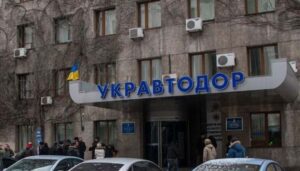
The State Agency for Highways of Ukraine (Ukravtodor) is considering the possibility of attracting additional funding for road repairs this year.
“We are considering all possible options, in particular, both credit and grant funds. We are negotiating with our European partners and not only with them about raising funds from various sources. It is too early to talk about any specific decisions and projects, but I think that in a month we will be able to substantively announce the final stage of negotiations and the amounts that we can raise before the end of this year,” Andriy Ivko, first deputy head of Ukravtodor, said in an interview with Interfax-Ukraine.
He noted that even after the agreed deferment of payments on Eurobonds, international partners are ready to meet halfway in matters of attracting additional financing by Ukravtodor.
“Even in civilian life, these are common practices in both the public and private sectors. We have force majeure, the biggest war on the European continent continues, so they meet us halfway. And restructuring will make it easier for us to endure what is happening today. I have from a financial point of view,” he said.
As reported, since August 11, 2022, Ukravtodor, which placed debut Eurobonds worth $700 million maturing in 2028 at a rate of 6.25% in June last year under state guarantees, received the consent of the holders of these securities to defer interest payments on them and transfer their maturity for two years.

Vodafone Ukraine, which is part of NEQSOL Holding, announces the completion of regular interest payments on Eurobonds.
On February 11, 2020, the Company successfully priced its debut international capital markets issuance – 5-year bonds (“Eurobonds”) amounting to $500 million with a yield of 6.20%. Vodafone marked the lowest price in the entire history of Eurobonds issuance by a corporate issuer from Ukraine.
In accordance with the placement conditions, the coupon, namely the interest on the placed bonds, shall be paid every 6 months.
“Despite the difficult conditions caused by the war and the subsequent economic downturn, we continue to fulfill our commitments. This demonstrates the stability of our business and loan funds management efficiency, – commented on the payments Olga Ustynova, Vodafone Ukraine CEO. – The Company remains committed to maintaining a robust liquidity position as well as a sustainable debt leverage profile.”
As of today, the amount of the bond balance is $400 million. The Company has already redeemed and made a premature payment of $100 million.
Vodafone Ukraine has been successfully operating on the international debt capital market since 2018.
—
For additional information, please contact:
Vodafone
Investor Relations
IR@vodafone.ua
About Vodafone
Vodafone is one of the world’s largest telecommunications companies and provides a range of services including mobile voice, data, messaging, fixed broadband and cable television. The operator has mobile operations in 21 countries, partners with mobile networks in 52 countries. As of 31 December 2021, Vodafone had over 300 million mobile customers, 28 million fixed broadband customers. The Company connects over 142 mil IoT devices and platforms. For more information, please visit www.vodafone.com.
Vodafone Ukraine is a leading mobile operator in Ukraine that provides high-speed 3G and 4G Internet services. Vodafone’s investments during the active construction of high-speed Internet networks in 2015-1Q2022 exceeded UAH 32.7 bln. The record investments allowed to provide technological leadership and to develop new technological services – Internet of Things (IoT), technologies and solutions for Smart City, big data analytics, Fintech services, cloud services. Vodafone has over 19 million customers in Ukraine. Since December 2019, Vodafone Ukraine has been part of NEQSOL Holding.
About NEQSOL Holding
NEQSOL Holding is a diversified group of companies operating across industries and countries. The main business areas cover oil and gas, telecommunications, hi-tech, and construction industries.
The group of companies operates in the UK, the USA, Turkey, Azerbaijan, Ukraine, Georgia, Kazakhstan, the UAE, and other countries.

The State Agency for Highways of Ukraine (Ukravtodor), which placed its debut Eurobonds worth $700 million at a rate of 6.25% last June under state guarantees, after Ukraine announced a proposal for a two-year deferral of payments on its Eurobonds, is now time is also evaluating options for managing its obligations.
“After this assessment is completed, it is likely that bonds will be followed by a similar liability management exercise in the near future,” Ukravtodor said in a London Stock Exchange announcement on Monday.
Ukraine, in its offer to holders of its sovereign bonds to defer payments on them for two years, indicated that it expects a similar offer from state NPCs Ukrenergo and Ukravtodor for their Eurobonds issued under state guarantees.
In November last year, Ukrenergo placed, under state guarantees, debut five-year “green” Eurobonds worth $825 million with a yield of 6.875% and interest payments twice a year. The proceeds from the issue of Eurobonds were used to pay for electricity produced by RES generation.
As reported, on July 20, Ukraine proposed to holders of Eurobonds from August 1 to defer all payments on them and maturities for two years, while maintaining the current rates of return.
In addition, Ukraine’s international partners within the G7 and the Paris Club of creditors announced their readiness to suspend the payment of Ukraine’s debt until the end of 2023 with the possibility of extending the deferment for another year. They also urged private lenders to accept Ukraine’s offer to defer payments on its Eurobonds and change the terms of its GDP warrants.
According to the website of the Frankfurt Stock Exchange, on Friday, July 22, Eurobonds of Ukravtodor were quoted at a price of 17.64% of the face value, which is slightly lower than the quotations of sovereign Eurobonds of the same maturity year (about 20%).

The energy holding DTEK Energo asked the holders of its Eurobonds for $1.645 billion maturing in 2027 to agree to the payment of the next two coupons for the first and second quarters of this year at a rate of 3.5% per annum, with a capitalization of the remaining 4% at a rate of 8.5% per annum and paid later.
According to the company’s announcement on the London Stock Exchange, DTEK Energo expects a response from the holders by 16:00 London time on April 8.
In case of a positive answer, half of the coupon due on March 31 will be paid the next day after the approval of the Eurobond holders’ consent, and half of the coupon on June 30 – on the same day, June 30.
Earlier in March, the agricultural holding MHP, the largest producer of chicken meat in Ukraine, had already approached holders of three issues of its Eurobonds worth $1.4 billion and creditor banks worth $126 million with a proposal to defer interest payments for 270 days due to the war launched by Russia against Ukraine. MHP received a positive response from its creditors ahead of schedule.
“The revision of the conditions for making coupon payments to holders of DTEK Energy’s Eurobonds was caused by a significant deterioration in the company’s financial performance in March 2022 amid the war with the Russian Federation (…) This is an expected step during the war in Ukraine,” Interfax-Ukraine was previously explained “The company needs this step.
In the latest exchange announcement, DTEK Energy indicated that due to the war unleashed by Russia, it faced a number of serious problems and disruptions, including, among other things, a reduction in domestic demand for electricity and a decrease in its prices (up to UAH 1,800–2,000 per MWh ). In addition, exports were stopped until March 28, and after the resumption they go only to Poland and are limited to 200 MW per day, the collection of payments has significantly decreased, critical repairs and mandatory fixed costs have increased as a result of the damage incurred, and there is also a shortage of personnel and logistics. support.
The company added that on February 25, it lost control over the Luhanska TPP, and the Zaporizhzhya TPP, due to the impossibility of delivering coal reserves to it due to damage and disruptions in the operation of the railway infrastructure, operates only one unit. During March, DTEK Energy was able to operate on average only 9 to 13 units of its thermal power plants with a total capacity of only about 1,500 MW, and, accordingly, its electricity production fell by about 30% compared to March 2021, the report specifies.
As a result, the group posted negative operating cash flow for March 2022 and expects this to continue through at least the second quarter of 2022.
DTEK Energy also allows for the postponing of the publication of its audited consolidated financial statements for 2021, given the scale of disruptions in the group’s business and operating environment and the need to provide additional time for auditors to analyze conditions in Ukraine and their impact.
Earlier, when addressing creditors, the company emphasized that it had already taken a number of measures to mitigate the consequences and to rationalize operations and cash flows. Among them, in particular, the constant balancing of the necessary efficient production based on the ratio of fixed and variable costs and the collection of payments; negotiations with the regulator and other government agencies to maintain a proper business environment; minimizing capex and optimizing administrative costs.
“(…) in the current circumstances, the proposals are in the interests of the company, its creditors and all interested parties (…). DTEK Energy is confident in the understanding and support of the international investment community, which is extremely important so that it can firmly and unitedly fight for the integrity freedom and security of independent Ukraine,” the company noted on March 31, when it first announced its intention to capitalize and defer the payment of half of the next two coupons.
DTEK Energy is an operating company responsible for coal mining and electricity generation from coal within Rinat Akhmetov’s DTEK holding.

On Wednesday, March 9, the prices of Ukrainian U.S. dollar-pegged eurobonds rose by another 4.5-10%, and in general since last Friday their growth reached 20-43%.
According to Bloomberg, the price of the shortest bonds maturing in September 2022 at the end of Wednesday was 45.4% of par, which corresponds to a yield to maturity of 270.9% per annum, while at the end of last week the rate reached 362.4%.
Eurobonds maturing in 2023 were quoted at a rate of 86.4% per annum, in 2024 – 68.5% per annum, in 2025 – 50.6% and in 2026 – 43.8%.
Rates on securities maturing in 2027-2028 fell to 39-40% versus 49-51% last Friday, and on longer-term bonds maturing in 2029-2031 they amounted to 32.6-28.1%, while their price was equal to 30% of the nominal versus 21.8% at the end of last week.
Euro-pegged bonds maturing in 2026 were quoted with a yield of 46%, in 2030 – 26.2%.
The rate of VRIs rose by 7.5% on Wednesday, and by 54.5% since Friday, and now stands at about 22.8% of the nominal value.

Ukraine is to place an additional $500 million 2029 eurobonds at 6.3%, a banking sector source told Interfax.
Initial yield guidance for the additional tranche maturing in 2029 was 6.625%. During book building, Ukraine was able to reduce the yield, with final guidance set in the range of 6.3%-6.4%.
Demand for the country’s eurobonds exceeded $1.8 billion at its peak, and stood at about $1.7 billion in final bidding.
BNP Paribas and Goldman Sachs are the organizers of the deal.
Ukraine placed $1.25 billion in eurobonds maturing in 2029 in April of this year at a coupon rate of 6.876%.